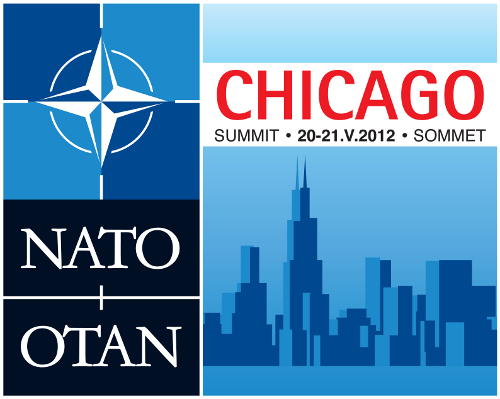
Coming off the heels of a very successful NATO summit in Lisbon, Portugal, in November 2010, it looked like President Obama would make the coming NATO summit in Chicago May 20 and 21 – an election-year meeting of America’s strongest allies on American soil – a centerpiece of his campaign, highlighting great successes in his foreign policy.
The Lisbon Summit had produced an ambitious strategic concept with a bold vision for NATO’s future, including a renewed commitment to the fight in Afghanistan, a robust agreement on missile defense, and deepened cooperation on emerging challenges such as cyber security. Eighteen months later, not nearly enough progress has been made – and certainly not enough for Mr. Obama to tout.
To avoid the Chicago summit ending up as a total bust, Obama must push NATO leaders to address those three major issues on the agenda.
First, a slew of recent events in Afghanistan appears to be hastening a rush for the exits. In Lisbon, NATO leaders agreed on a robust operation through the end of 2014 that would be followed with an indefinite training and support commitment. Now, the talk is about getting many forces out by 2013.
Obama’s newly signed strategic agreement with Afghanistan ensures ongoing security support, but requires a supporting military strategy. NATO needs a plan to guide these efforts and provide a logical plan for forces, their missions, and broad withdrawal rates.
Second, the Obama administration must push NATO to make better progress on addressing its capabilities shortfalls highlighted by departing Secretary of Defense Robert Gates last June. He warned of a two-tiered alliance with a “dim, if not dismal” future if European allies didn’t reverse years of defense cuts. Those shortfalls were brought to light starkly by the otherwise enormously successful Libya operation, where, despite claims of “leading from behind,” the United States supplied virtually all of the targeting personnel, intelligence, surveillance, reconnaissance, and air-to-air refueling capabilities.
NATO Secretary General Anders Fogh Rasmussen has been pushing allies to commit to a “Smart Defense” approach that would pool resources and integrate European military procurement to ensure the alliance retains needed capabilities even while individual allies make deep defense cuts. While there has been good work at the technical level, national budget decisions continue to be made in isolation and without a coherent overarching approach.
At minimum NATO should provide a clearinghouse for coordination of defense cuts. But that is not happening, reinforcing fears that NATO would not be able to conduct even a limited operation such as that over Libya if called upon a few years hence. The Obama administration needs to pressure NATO leaders to develop a clear structure for coordinating resources and individual budget decisions – and it needs to be prepared to assist them in doing so.
Third, while the Lisbon declaration stressed the need for building partnerships with non-NATO members to increase alliance capabilities – and Libya highlighted the effectiveness and necessity of that approach – progress on this process has been moving at a glacial pace, constrained by bureaucratic routine.
But this is no time for routine. The atrocities in Syria are ongoing. Unrest continues to bubble across the Middle East and North Africa. And the threat of an Iran crisis looms, which from its outset would directly involve NATO members in the neighborhood (Turkey) or with forces in the region (United States, Britain).
In light of all this, the Gulf Cooperation Council countries in particular are practically begging NATO to deepen its outside relationships. (NATO also needs to formalize partnerships with Australia and other key Asian players.) At a minimum, NATO must initiate greater outreach regarding air, missile defense, and maritime operations with the United Arab Emirates, Qatar, and other Gulf countries who are interested in operational links to NATO.
At the Chicago summit, the Obama administration can exert leadership to make inroads on areas where consensus is emerging.
Moving ahead on “smart defense” requires an agreement on which capabilities must be maintained by all allies and which can be shared responsibilities, with some providing capabilities that all can rely upon if needed.
On Afghanistan, maintaining Lisbon’s 2014 timeline may no longer be possible, but Chicago should at the very least result in an agreement to follow a NATO timeline, not one set by the domestic politics of individual allies.
On cyber security, allies need to move toward common standards for national cyber assets to ensure continued interoperability. On partnerships, NATO should engage in structured outreach at multiple levels to its Gulf partners who already have joined NATO military operations.
Finally, NATO should formalize the reality made clear by the Libya operation and set forth procedures for “coalitions of the willing” among NATO members to employ alliance command and control assets in the absence of unanimous participation.
If Obama can push NATO on these critical points, and help foster consensus, there is some hope that NATO will remain as relevant to protecting US interests in the 21st century as it was in the last.
Barry Pavel is director of the International Security Program and James Joyner is managing editor of the Atlantic Council. This article originally appeared in The Christian Science Monitor and is part of a series of New Atlanticist pieces on NATO’s 2012 Chicago Summit.
Image: NATO-Chicago-Summit-Logo.jpg
